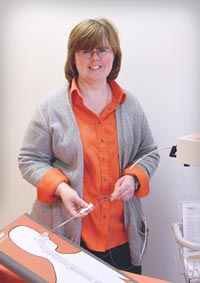
Credit: Actuated Medical, Inc.
Fields: Materials science, logistics
Works at: Actuated Medical, Inc., a small company that develops medical devices
Second job (volunteer): Bellefonte YMCA Swim Team Parent Boost Club Treasurer
Best skill: Listening to people
Last thing she does every night: Reads to her 7- and 10-year-old children until “one of us falls asleep”
If you’re a fan of the reality TV show Shark Tank, you tune in to watch aspiring entrepreneurs present their ideas and try to get one of the investors to help develop and market the products. Afterward, you might start to think about what you could invent.
Maureen L. Mulvihill has never watched the show, but she lives it every day. She is co-founder, president and CEO of Actuated Medical, Inc. (AMI), a Pennsylvania-based company that develops specialized medical devices. The devices include a system for unclogging feeding tubes, motors that assist MRI-related procedures and needles that gently draw blood.
AMI’s products rely on the same motion-control technologies that allow a quartz watch to keep time, a microphone to project sound and even a telescope to focus on a distant object in a sky. In general, the devices are portable, affordable and unobtrusive, making them appealing to doctors and patients.
Mulvihill, who’s trained in an area of engineering called materials science, says, “I’m really focused on how to translate technologies into ways that help people.”
This is why she left her former position and started AMI. She had been director of research and development (R&D) at a company focused on military devices. When a doctor contacted her about his need for new medical devices, she realized that, although she couldn’t address his need in her current position, she could in a new one.
Today, she works closely with doctors as well as engineers to design, test and commercialize products that solve critical clinical needs and improve patient outcomes. Strategizing and managing projects with her team of 26 employees are just two aspects of her job, she says.
Another important one is writing grant applications that, like a sales pitch on the TV show, seek funding to turn ideas into products. Last year, AMI was recognized for its success in commercializing projects funded by the federal Small Business Innovation Research (SBIR) program ![]() . The SBIR program invests in R&D activities that have strong potential for commercialization.
. The SBIR program invests in R&D activities that have strong potential for commercialization.
Her Current Project
One of AMI’s current SBIR-funded projects is a spinal needle insertion system that could improve how doctors give regional anesthesia during medical procedures.
“Often we look at nature for solutions,” says Mulvihill. “When a mosquito takes your blood, you don’t feel it because she’s vibrating her proboscis.”
AMI’s needle insertion system uses the same strategy: It vibrates the needle so spinal injections go in smoothly, making them feel less painful and ultimately improving patient outcomes. The system lets anesthesiologists use thinner, non-cutting needles that are less prone to bend and break than the standard needles. Thinner needles minimize the risk of spinal headaches, which can also result in extended hospital stays, permanent nerve injuries and infection. In addition, the new system should provide anesthesiologists with a better sense of where the needle is—in muscle or fat, for example—so they can more accurately guide its placement.
AMI will soon begin evaluating the needle system in a human clinical trial to make sure that it’s effective and, most of all, safe.
The company is also developing a needle-free system for delivering drugs and vaccines and a tool for taking bone biopsies. More are to come, says Mulvihill, adding, “We are always looking for the next device to improve patient outcomes.”


Very interesting. I wish you continued success not only in your inventions but also in attracting the caliber of assistance you need.